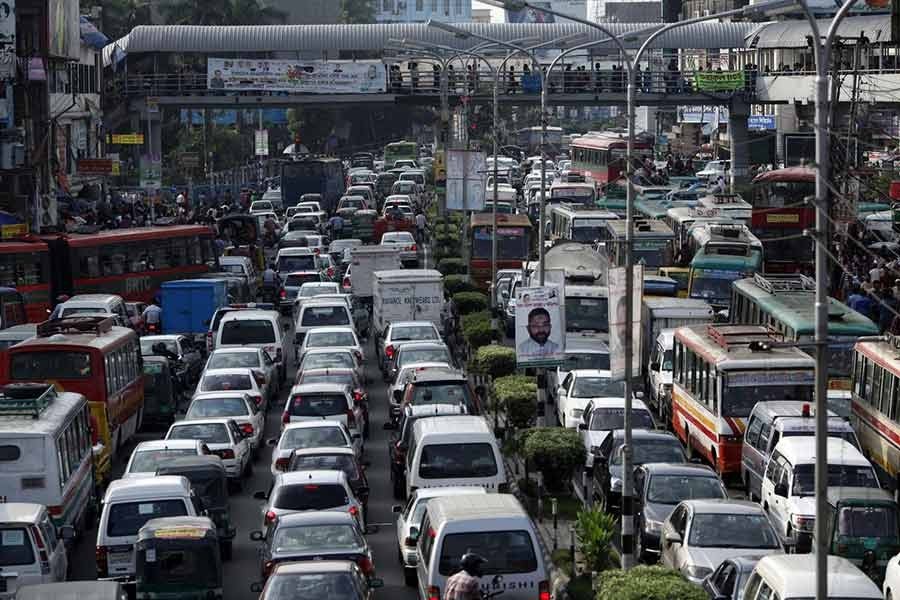Dhaka city, according to the World Traffic Index-2020, is ranked 10th among 228 global cities having the worst traffic. Many residents of Dhaka city may find the WTI ranking somewhat generous. They tend to believe that their city deserves to be placed a few notches above in the ranking because of its dreadful traffic system.
For nearly three months, the streets of the city were quiet and deserted because of the ongoing Covid-19 pandemic. That was a sight beyond the wildest imagination of many. It is not just with the city's traffic system, many more abnormal things did happen as the novel coronavirus wreaked havoc on life and livelihood across the country like elsewhere in the world. The worst is not yet over. The virus is still there and taking its toll daily.
With the resumption of normal economic activities, road transports are back on the streets of Dhaka. Along with those has returned the usual hustle and bustle.
The buses, numbering about 4,500, plying the city streets, as usual, are demonstrating their erratic behaviour. Drivers of the privately-owned buses give a damn to traffic rules and regulations; they are seen engaging in a mad race on the busy streets to pick up passengers from anywhere. It seems that there are no designated bus stoppages along the city streets. Buses pick up and drop passengers throughout their journey.
Looking at the behaviour of bus drivers in Dhaka city, one has ample reason to believe that these bus operators are above the law of the land and none is there to control them. The relevant authorities might find such an observation highly objectionable, but, unfortunately, the situation on the ground is not at all eye-soothing.
The unruly behaviour of a bus driver had triggered an unprecedented street protest by students back in 2018. That agitation resulted in the adoption of a new road transport act by parliament in 2018. The government took nearly one year to put into effect the new law as it feared backlash from the transport workers and owners. The new law contains harsh penalties for traffic rule violators.
In the face of transport workers' protests, including countrywide transport strike, in November 2019, execution of the new act was put on hold by the authorities. It was not, however, clear how an act of parliament, once put into effect, could be put on hold without the consent of parliament.
The current state of the new transport law is also not clear. Traffic sergeants who had been very aggressive in issuing tickets to the violators of traffic rules, have virtually withdrawn themselves from such a practice. They are hardly seen issuing tickets, these days. The situation, thus, might have given rise to unfair practices on the part of the on-duty traffic policemen.
So, under the circumstances, it is hard to expect any positive results in the matters of traffic situation through legal means. A tough transport act designed to control errant bus operators is there, but its application is somewhat restrained.
In such a situation, the relevant authorities have no other way but to look for other options. One such option -- rationalisation of bus routes by bringing all public buses under six separate transport companies -- floated in 1997 under Dhaka Urban Transport Project (DUTP) has been considered to be a viable one.
The plan remained shelved until 2015 when late Dhaka North City mayor Annisul Huq picked it up for implementation. He had started setting strategies for its execution in cooperation with other stakeholders, including the Dhaka South City Corporation (DSCC) and the Dhaka Transport Coordination Authority (DTCA). But with the demise of Mr Annisul Huq, the initiatives lost steam. Immediate past mayor of DSCC Syed Khokon was made chairman of the committee on bus route rationalisation. Mr Khokon held only one meeting of the committee in November 2018 and promised to implement the plan within a couple of years. But there had been no progress on the issue during his tenure
The minister in-charge of road transport has recently expressed his dissatisfaction over lack of progress in rationalisation and revamping of bus routes. The fact remains that instead of rationalisation of bus routes, new routes are being allowed unabatedly by the Bangladesh Road Transport Authority (BRTA), a very important entity under his ministry. The number of bus routes in Dhaka city was 156 in 2013 and the number has more than doubled since then.
It is obvious that the transport owners are not in favour of the new initiatives to rationalise bus routes and place all buses under the control of six separate companies. They fear losing control over the transport sector following the execution of the plan. The bus and truck owners, aided by their workers, are a big and influential force and it is quite difficult for any government to ignore them. So, one of the major reasons for the bus route rationalisation plan being stuck could be pressure from them.


